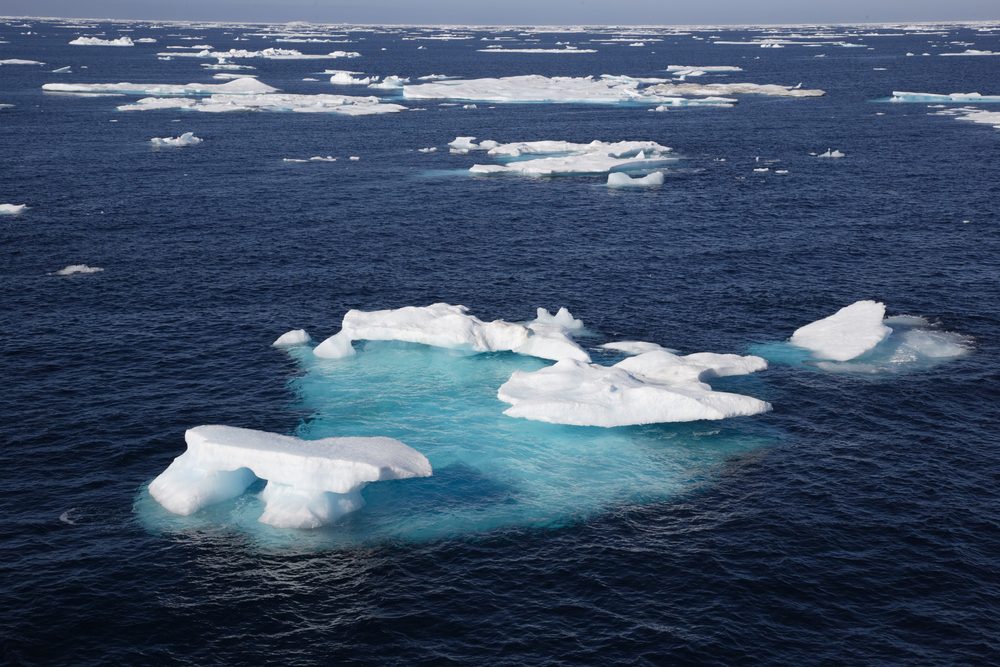Good News For Tuna, Bad News For Sharks, Sea Snails, And Dragons
By Emma Farge and Cecile Mantovani (Reuters) – The populations of four of the most commercially fished tuna species are showing signs of recovery but rising sea levels mean the...

By Achim Baque / Shutterstock
Arctic ecosystems and communities are increasingly at risk due to continued warming and declining sea ice, according NOAA’s 2019 Arctic Report Card.
![]() By Timothy Gardner and Yereth Rosen WASHINGTON/ANCHORAGE, Dec 10 (Reuters) – Climate change is causing chaos in the Bering Sea, home to one of America’s largest fisheries, an example of how rising temperatures can rapidly change ecosystems important to the economy, U.S. federal government scientists said in a report on Tuesday.
By Timothy Gardner and Yereth Rosen WASHINGTON/ANCHORAGE, Dec 10 (Reuters) – Climate change is causing chaos in the Bering Sea, home to one of America’s largest fisheries, an example of how rising temperatures can rapidly change ecosystems important to the economy, U.S. federal government scientists said in a report on Tuesday.
Rising temperatures in the Arctic have led to decreases in sea ice, record warm temperatures at the bottom of the Bering Sea and the northward migration of fish species such as Pacific cod, the U.S. National Oceanic and Atmospheric Administration, or NOAA, said in its 2019 Arctic Report Card.
While the changes are widespread in the Arctic, the effect on wildlife is acute in the eastern shelf of the Bering Sea, which yields more than 40% of the annual U.S. fish and shellfish catch.
“The changes going on have the potential to influence the kinds of fish products you have available to you, whether that’s fish sticks in the grocery store or shellfish at a restaurant,” said Rick Thoman, a meteorologist in Alaska and one of the report’s authors.
The warning was the latest from a U.S. government agency about climate change even as President Donald Trump has voiced skepticism about global warming and pushed to maximize production of oil, gas and coal. Last month his administration filed paperwork to withdraw the United States from the 2015 Paris agreement on climate change.
The report identified a decrease in recent years in the Bering Sea “cold pool,” which used to be a dependable mass of very salty frigid water down to the sea floor that functioned as a natural fence separating fish species. That has likely caused a shift in distribution of walleye pollock and Pacific cod, the report said.
No cold pool was found in 2018 and this year it was smaller than normal, it said.
Fish stocks are scrambled, with some species moving north. Crab fishermen in Nome have reported catching more cod than crabs, as Pacific cod are not doing as well south of there. Last week, the North Pacific Fishery Management Council shut down the 2020 Pacific cod harvest in the Gulf of Alaska.
“It’s heartbreaking,” said Simon Kinneen, the chairman of the North Pacific Fishery Management Council. Cod stocks have been hard hit by successive heat waves in the Gulf of Alaska, fishery scientists say.
The report also said the melt of the ice sheet over Greenland this year rivaled that of 2012, the previous year of record ice loss.
It also detailed a shift of Arctic permafrost regions from being a sink for carbon dioxide emissions to a source of them, as warming uncovers soil, triggering microbes to emit the main gas linked to global warming.
The wide ecosystem changes also affect the 70 communities of indigenous people in the Bering Sea, with hunters seeking seals, walrus, whales and fish having to travel much farther offshore as the ice melts.
“Our hunters are finding it more difficult to navigate on the land and are moving out to sea,” Mellisa Johnson, the executive director of the Bering Sea Elders, told a meeting in San Francisco of the American Geophysical Union, where the report was released.
Scientists said warming in the Arctic, which functions as a global air conditioner, could lead to rapid changes far away from the region.
“Two years ago nobody was talking about a wholesale shift in the Bering Sea ecosystem,” Thoman said. (Reporting by Timothy Gardner in Washington and Yereth Rosen in Anchorage; Editing by Dan Grebler)
(c) Copyright Thomson Reuters 2019.
This article contains reporting from Reuters, published under license.

Sign up for gCaptain’s newsletter and never miss an update

Subscribe to gCaptain Daily and stay informed with the latest global maritime and offshore news
Essential news coupled with the finest maritime content sourced from across the globe.
Sign Up